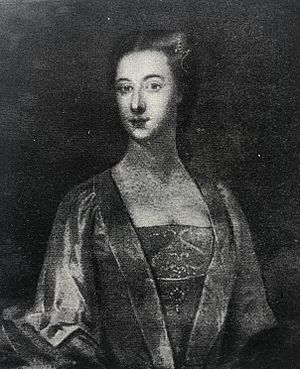Mary Twining facts for kids
Mary Twining (1726-1804) was an amazing businesswoman who led the famous tea company, Twinings, for nearly 20 years! She took charge from 1763 to 1782 after her husband, Daniel Twining, passed away. Her sons, Richard Twining and John Twining, later took over the family business from her. Today, Twinings is still a very well-known tea brand all around the world.
Contents
Mary's Early Life
Mary Little was born on August 9, 1726, in Wisbech, England. She was the oldest daughter of Richard Little, who was a merchant.
In 1745, Mary married Daniel Twining. Daniel already had a son named Thomas from his first marriage. Together, Mary and Daniel had three more sons: Daniel, Richard, and John. Sadly, their son Daniel (born 1748) passed away young in 1765 while he was studying at Eton College.
Mary Twining lived to be 78 years old, passing away in 1804.
Leading the Twinings Tea Company
Before Daniel Twining's sudden death in 1762, he was in charge of the family business. His father, Thomas Twining, had started the company.
When Daniel died, Mary was left to care for their four sons. Daniel's business partner, Nathaniel Carter, left the company soon after in 1763. This meant Mary had to step up and run the business herself. She managed the company, which was then called "Twining's," from 1763 until 1782.
Starting in 1763, official London records listed the business as "Mary Twining. Tea Warehouse, Devereux Court, Strand." This shows she was fully in charge.
Even though it was unusual for women to lead businesses in the 1700s, Mary Twining did an excellent job. Under her leadership, Twinings continued to grow its tea sales around the world. The company stayed strong, even when taxes on tea became very high.
Challenges in the Tea Business
During the late 1700s, tea was very expensive in England. This was partly because of high import taxes. Because of the high cost, many people started to smuggle tea into the country. Smugglers would bring tea illegally from places like Holland or France. They often mixed the tea leaves with other things to make more money, which made the tea quality much worse.
Another big challenge was the American Revolution, which started in 1765. This war was partly because people in the American colonies felt that England was taxing imported goods too heavily. Events like the Boston Tea Party in 1773 showed how much people disliked these tea taxes.
The war was very expensive for England and put the country in debt. This led to even higher taxes on tea and other imported goods. By 1784, it's thought that two-thirds of all tea bought in Great Britain was smuggled tea.
Despite these challenges, Mary Twining was very honest. She wrote in her diary that she never bought smuggled tea for the business. She wanted to make sure Twinings was always known for its high-quality products.
Mary's Lasting Legacy
Before Mary Twining passed away in 1804, she handed over the family business to her sons. Her son, Richard Twining, had left Eton College at age 14 to help his mother. Working alongside Mary, he learned a lot about the tea business from a young age.
Thanks to Mary's hard work and smart decisions, Twinings is still a successful company today, more than 300 years after it first started!
 | Delilah Pierce |
 | Gordon Parks |
 | Augusta Savage |
 | Charles Ethan Porter |


